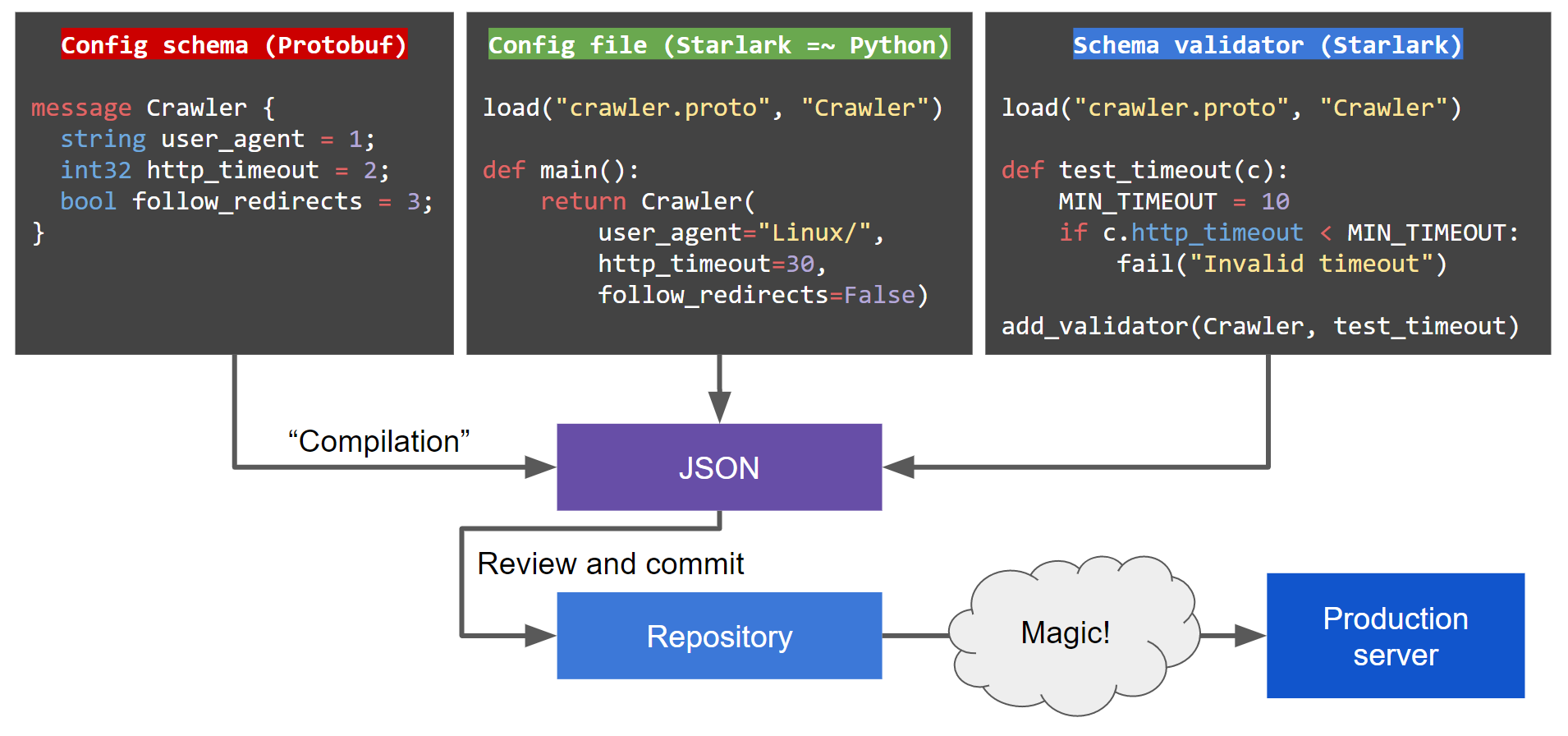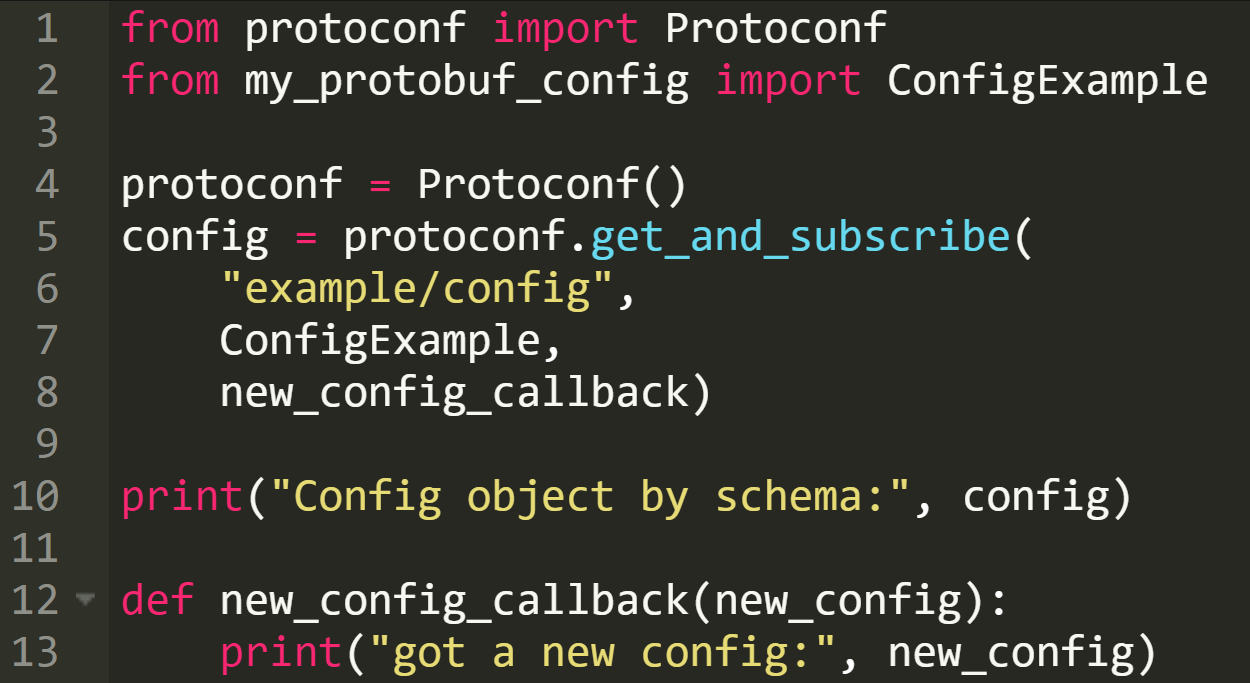Modern services are comprised of many dynamic variables, that need to be changed regularly. Today, the process is unstructured and error prone. From ML model variables, kill switches, gradual rollout configuration, A/B experiment configuration and more - developers want their code to allow to be configured to the finer details.
Protoconf is a modern approach to software configuration, inspired by Facebook's Configerator.
Using Protoconf enables:
- Code review for configuration changes Enables the battle tested flow of pull-request & code-review. Configuration auditing out of the box (who did what, when?). The repository is the source of truth for the configuration deployed to production.
- No service restart required to pick up changes Instant delivery of configuration updates. Encourages writing software that doesn't know downtime.
- Clear representation of complex configuration Write configuration in Starlark (a Python dialect), no more copying & pasting from huge JSON files.
- Automated validation Config follows a fully-typed (Protobuf) schema. This allows writing validation code in Starlark, to verify your configuration before it is committed.
This is roughly how configuration is consumed by a service. This paradigm encourages you to write software that can reconfigure itself in runtime rather than require a restart:
As Protoconf uses Protobuf and gRPC, it supports delivering configuration to all major languages. See also: Protobuf overview.
Step by step instructions to start developing with Protoconf, with an example from an imaginary Python web crawler service. See full example under examples/.
-
Install the
protoconfbinary (see build from source) -
Write a Protobuf schema under
protoconf/src/(syntax guide https://developers.google.com/protocol-buffers/docs/proto3)- For example:
protoconf/src/crawler/crawler.proto
syntax = "proto3"; message Crawler { string user_agent = 1; int32 http_timeout = 2; bool follow_redirects = 3; } message CrawlerService { repeated Crawler crawlers = 1; enum AdminPermission { READ_WRITE = 0; GOD_MODE = 1; } map<string, AdminPermission> admins = 2; int32 log_level = 3; }
- Pro tip: adding fields to an existing schema? Don't worry, Protobuf is backward and forward compatible (https://en.wikipedia.org/wiki/Protocol_Buffers)
- For example:
-
Write validators (optional)
- Write a Starlark file alongside the
.protofile, with a.proto-validatorsuffix - For example:
protoconf/src/crawler/crawler.proto-validator
load("crawler.proto", "Crawler", "CrawlerService") def test_crawlers_not_empty(cs): if len(cs.crawlers) < 1: fail("Crawlers can't be empty") add_validator(CrawlerService, test_crawlers_not_empty) def test_http_timeout(c): MIN_TIMEOUT = 10 if c.http_timeout < MIN_TIMEOUT: fail("Crawler HTTP timeout must be at least %d, got %d" % (MIN_TIMEOUT, c.http_timeout)) add_validator(Crawler, test_http_timeout)
- Write a Starlark file alongside the
-
Write a config
-
A Starlark
.pconffile. Your code can be modular, export functions (ideally in.pincfiles), and build a complete custom stack for your configuration needs. -
For example:
protoconf/src/crawler/text_crawler.pconfload("crawler.proto", "Crawler", "CrawlerService") def default_crawler(): return Crawler(user_agent="Linux", http_timeout=30) def main(): crawlers = [] for i in range(3): crawler = default_crawler() crawler.http_timeout = 30 + 30*i if i == 0: crawler.follow_redirects = True crawlers.append(crawler) admins = {'superuser': CrawlerService.AdminPermission.GOD_MODE} return CrawlerService(crawlers=crawlers, admins=admins, log_level=2)
-
Compile with
protoconf compile, this will create a materialized config file underprotoconf/materialized_configs/ -
For example:
protoconf compile protoconf/ crawler/text/crawlerwill createprotoconf/materialized_config/crawler/text_crawler.materialized_JSON
{ "protoFile": "crawler/crawler.proto", "value": { "@type": "https://CrawlerService", "admins": { "superuser": "GOD_MODE" }, "crawlers": [ { "userAgent": "Linux", "httpTimeout": 30, "followRedirects": true }, { "userAgent": "Linux", "httpTimeout": 60 }, { "userAgent": "Linux", "httpTimeout": 90 } ], "logLevel": 2 } } -
-
Run the Protoconf agent in dev mode
protoconf agent protoconf/
-
Prepare your application to work with Protobuf configs coming from Protoconf
-
Compile your
.protoschema, this will generate an object to work with. For Python you can usegrpcio-tools, for example:pip3 install grpcio-tools python3 -m grpc_tools.protoc --python_out=. -I../protoconf/src ../protoconf/src/crawler/crawler.proto
Other languages can use the
protocbinary (https://developers.google.com/protocol-buffers/docs/tutorials). -
Install the Protoconf Python library:
pip3 install -r python/requirements.txt python/
- In your code, setup a connection to Protoconf and get the config. See full example under
examples/. The code mainly consists of:
from protoconf import ProtoconfSync from crawler.crawler_pb2 import CrawlerService protoconf = ProtoconfSync() crawler_service = protoconf.get_and_subscribe("crawler/text_crawler", CrawlerService, got_config) print("config:", crawler_service) def got_config(new_crawler_service): print("got a new config:", new_crawler_service)
-
-
Commit all changes under
protoconf/(including the.materialized_JSONfiles)
- Run your preferred key-value store (e.g. Consul)
- Run the Protoconf agent:
protoconf agent - Setup a commit hook in your repository server (e.g. Github) that runs
protoconf updateon changed.materialized_JSONfiles
- Clone Protoconf:
git clone https://github.com/protoconf/protoconf.git - Build the binary:
cd protoconf && go install ./cmd/protoconf - Ensure that GOPATH/bin is in your path
- Make sure Consul is listening locally on default port (you can achieve this with
consul agent -dev) - Run the agent:
bazel run protoconf agent - Compile the Protoconf config:
bazel run protoconf compile "$(pwd)/examples/protoconf" crawler/text_crawler.pconf - Insert the Protoconf config to Consul:
bazel run protoconf insert "$(pwd)/examples/protoconf" crawler/text_crawler.materialized_JSON - Run the Go client:
bazel run //examples/grpc_clients/go_client, the client will get the config from the agent and will listen to changes - Change the config file at
examples/protoconf/src/crawler/text_crawler.pconf - Repeat steps 4 & 5 to recompile and re-insert the config, observe the client got the updated config

